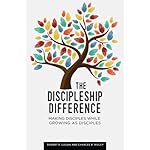One thing I have noticed about discipleship is that we have a tendency to think about it assembly line style. We want to run everyone through the same program, have everyone take the same class or read the same book, treat everyone the same.
But if you have raised kids– or even been around kids much– you know that’s an exercise in futility. Does every child need exactly the same thing? No. Some need lots of support and encouragement. Others have a strong drive for independence– “I can do it myself!” They each have different learning styles, different personalities, different preferences. Why should disciples be any different?
There’s an incredible diversity among people that extends beyond race and culture. There’s a diversity in how people learn, in how they grow, in what’s helpful to them. There are differences in their present life circumstances and their past experiences.
Yet we’re called to make disciples of all of these people, to teach them to obey all that God has commanded. Some need a huge challenge so they will engage. Others need baby steps so they can move forward. Some want to take big risks. Others want to proceed slow and steady. Give the wrong person the wrong kind of challenge and see how well that works.
To navigate all of these differences effectively, we need a process that can be customized to the uniqueness of each person. What’s God doing in their life? What’s going to be most helpful to them to think through the big picture? What are the next specific steps God’s asking them to take? We need something that will help each individual see both the broader scope of what God has for them and the next steps they need to take to get there. And that will look different for each person.
So that does that mean for us as we seek to disciple people?
- First it means that we can’t rely on a classroom approach as the main venue for discipleship. Rather, we need to rely on personal conversations. We need to sit down with an individual and ask them questions… questions about what they want, what they are hearing from God, what has worked well for them in the past, what has not. As we come alongside the person and get to know them, we can then effectively individualize our approach to fit their uniqueness.
- Second it means we can’t strictly follow a curriculum that goes through topics in a certain order. What if one person really needs to drill down into her spiritual gifts and ways to serve that flow out of those… but that’s not until chapter 10? She needs to be able to start with chapter 10 because that’s what God is calling her to address next, and it’s likely the key to unlocking chapters 1, 2, and 3 for her.
- Third it means that we cannot take ultimate responsibility for someone else’s walk of discipleship. We can come alongside a person, get to know him, listen and ask questions, try to help him discern what God may be doing in his life. But the person himself is responsible for his own development and spiritual journey.
We need to take a different approach to discipleship, treating different people differently and individualizing our approach to fit the uniqueness of each person. What works for one doesn’t necessarily work for another.
Consider: Who has God put in your life that you can help develop? What would they respond well to? What would be difficult for them? What is their learning style?
Purchase our latest book: “The Discipleship Difference: Making Disciples While Growing As Disciples”
The Discipleship Difference: Making Disciples While Growing As Disciples
The Discipleship Difference lays out an intentional, holistic, and relational approach to discipleship that is individualized to meet each person wherever they are.
As an Amazon Associate I earn from qualifying purchases.
Price: $14.99


